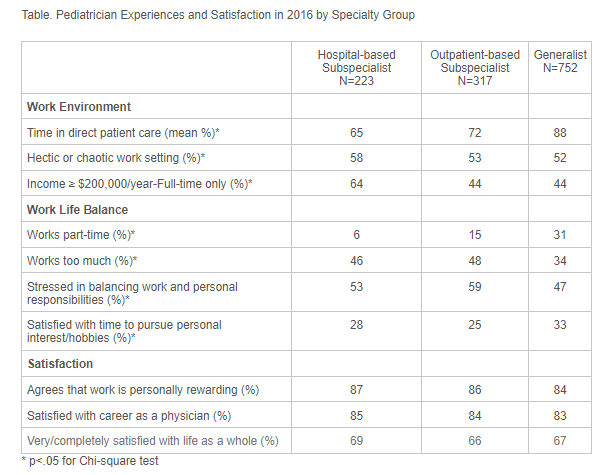Bobbi J Byrne, MD1; Mary Pat Frintner, MSPH2 ; William L Cull, PhD2 ; Laurel K Leslie, MD, MPH3 ; Debra Boyer, MD, MHPE4
1Indiana University, Indianapolis, IN, United States; 2American Academy of Pediatrics, Itasca, IL, United States; 3American Board of Pediatrics, Chapel Hill, NC, United States; 4Divison of Respiratory Diseases, Boston Children’s Hospital, Division of Respiratory Diseases, Boston, MA and Council of Pediatric Subspecialties Presented at the 2018 Pediatric Academic Societies Annual Meeting
Background: The choice to enter fellowship is based on many factors including financial circumstances, subject matter, research/teaching interests, role models, and lifestyle issues.
Objective: Compare personal and work experiences of pediatric generalists and two groups of subspecialists.
Methods: We analyzed nationally-representative, weighted 2016 data from the AAP Pediatrician Life and Career Experience Study, a longitudinal study of samples of pediatricians graduating residency in 2002-2004 and 2009-2011. Chi-square tests compared demographics, work environment, work-life balance, and satisfaction across 3 groups, categorized a priori into hospital-based subspecialists (>50% time in inpatient setting), outpatient-based subspecialists (<50% of time in inpatient setting), generalists (general pediatricians or hospitalists with no fellowship training). Multivariable logistic and linear regression examined independent effects of specialty, controlling for cohort, gender, international medical school (IMG), race/ethnicity, married and children.
Results: 1296 of 1801 PLACES participants are included in the analysis (completed the 2016 survey and working as a generalist or subspecialist). 17% work as hospital-based subspecialists, 25% outpatientbased subspecialists, and 58% generalists. 55% of hospital-based subspecialists, 56% of outpatientbased subspecialists and 74% of generalists are female, p<.001. Generalists are more likely than either group of subspecialists to spend work hours in direct patient care, work part-time, and be satisfied with time to pursue personal interests (Table). Both groups of subspecialists are more likely than generalists to report working in hectic settings, working too much, and being stressed balancing work and personal responsibilities. Hospital-based subspecialists are more likely to report higher earnings (measured as >$200,000/year). Majorities of all 3 groups report satisfaction in their work, career, and lives, with no significant differences among groups. All bivariate effects in the table remained significant in multivariable analysis.
Conclusion: Most pediatricians are satisfied with their career despite significant differences in work environment, income, and part or full-time status. Both groups of subspecialists have similarly hectic work settings, feelings of working too much, and stress, with pediatric outpatient-based subspecialists earning less.
